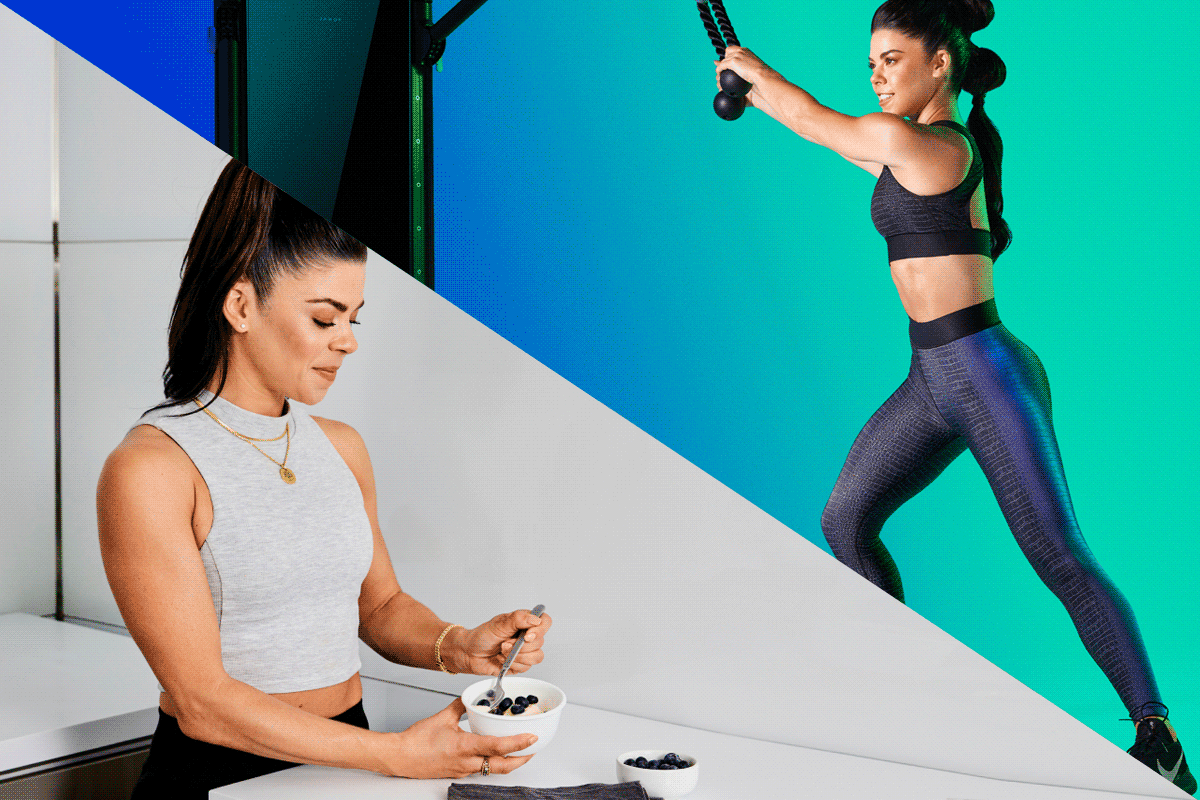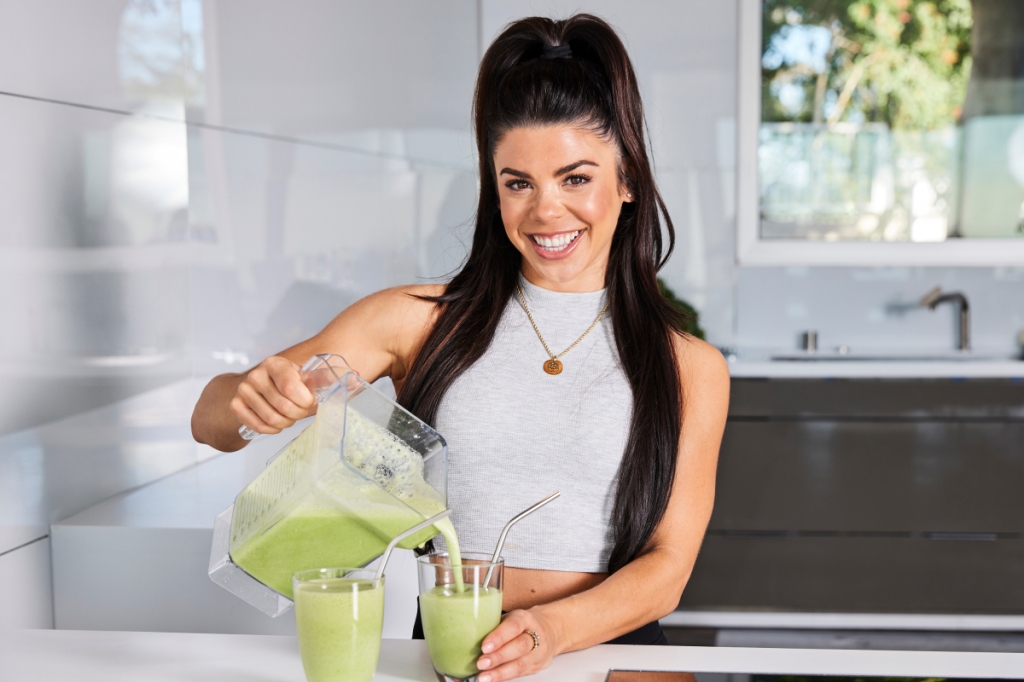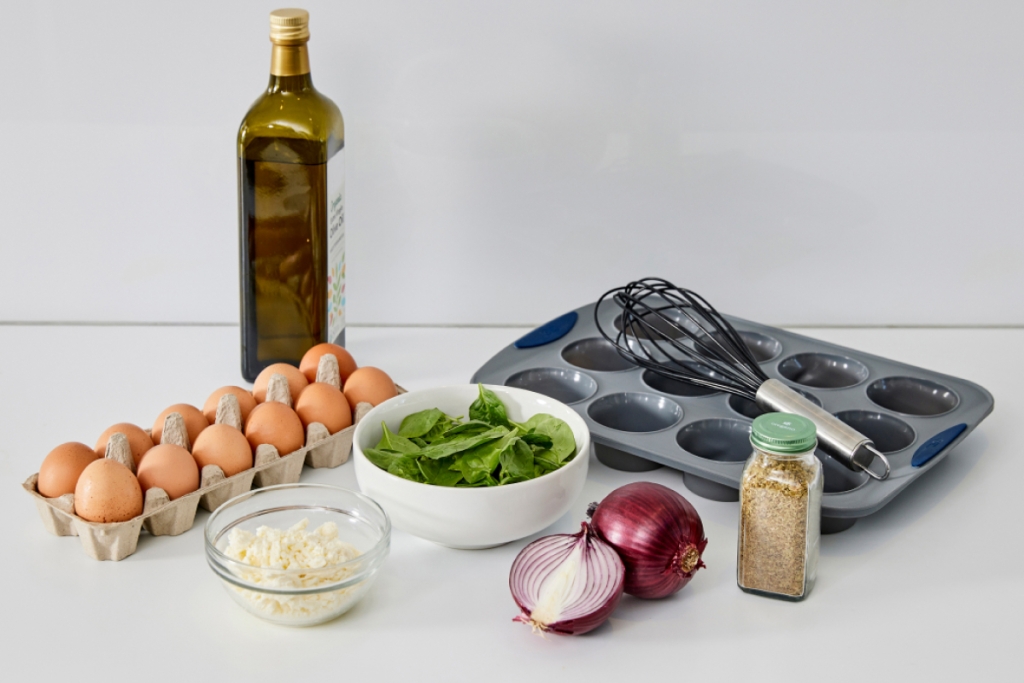Experts answer once and for all if breakfast before your morning workout is worth it.

With so much conflicting information floating around in the ether about when and how to eat for optimal fitness results, it can be tough to know whether having breakfast before your morning workout is really all it’s cracked up to be. Some experts say fitting in a pre-morning workout meal is so essential, it’s worth waking up a whole extra hour early. Some say “fasted” workouts (i.e. exercising on an empty stomach) are the ticket to better overall fitness and performance. With so many contradictory claims, what’s a morning exerciser to do before firing up their Tonal? And does the modality of movement matter when it comes to answering the age-old question, “to eat or not to eat”?
To make sense of the science, we turned to two nutrition pros who know a thing or two (or two hundred) about the impact of breakfast on a morning workout.
Registered dietitian nutritionist and board-certified sports dietitian Lauren Antonucci, MS, RDN, CSSD, CDCES, CDN, has a simple answer to the question of whether breakfast before a morning workout makes sense. “In a word, yes,” says the author of High Performance Nutrition For Masters Athletes and director of Nutrition Energy in New York City. “Studies consistently show that fueling up before a workout leads to improved ability to work harder for longer — and since hard work plus recovery equals fitness and performance gains, fueling up pre-workout is a must.”
Vanessa Rissetto MS, RD, CDN, co-founder of Culina Health in New York City has a slightly more nuanced stance on the matter. She agrees that a pre-workout meal may be beneficial in some scenarios but “that really depends entirely on preference.” Rissetto says that a quickie sweat session under 60 minutes may not merit a full meal. But in those cases, a post-workout refuel is essential. “For some people, not eating at least something before a morning workout could increase post-workout hunger levels and lead to overeating later,” she adds. “Pre-workout food can also impact exercise performance. If you feel like your hunger levels and performance ability are affected when you work out on an empty stomach, you should probably eat something.”
Does the type of workout you’re doing matter?
“Eating before would serve you better in all circumstances that involve affecting performance and/or muscle maintenance or gains,” Antonucci says. “Gone are the days where we mistakenly believe that endurance folks need carbs and resistance training folks need protein pre-and post-workout. All athletes need both! For anyone doing both endurance or cardio and resistance training sessions back-to-back, you would benefit from fueling up pre-workout with some carbs and protein and from including some protein and possibly carbs between the two disciplines depending on the duration of the entire double session.”
Again, personal preference is a necessary consideration when deciding what to eat and when, but different types of workouts do require different levels of energy and fuel to achieve optimal performance. “Your body’s main fuel source is carbohydrates,” she explains. “When you eat carbs, your blood sugar increases and your body uses that sugar to fuel exercise. When you go into a workout without eating, whether it be cardio or strength training, your body taps into stored carbohydrates (glycogen) and stored fat to use as fuel.”
Here is where the type of workout may affect what — and when — you choose to eat. “If you’re doing a long cardio workout, it’s possible that pre-workout carbohydrates will allow you to feel better, move faster, or last longer than if you’re doing a fasted workout,” Rissetto says. “If you’re strength training — especially strength training after a cardio workout where you have already depleted energy and glycogen stores — you’ll likely benefit from pre-workout fuel of carbohydrates and some protein. This may allow you to perform better, as your muscles and body will have the energy they need to lift heavier while maintaining proper form.”
What does the science say?
The research on the matter is, well, mixed. While most studies — like this 2014 paper published in the Journal of the International Society of Sports Nutrition — show no significant difference in measured outcomes between people who eat pre-workout breakfast and those who don’t, some studies indicate pros and cons to working out on an empty stomach. This 2015 paper from the Journal of Physical Therapy Science, for example, indicates that fasted workouts may contribute to fat loss, but may increase the stress hormone cortisol, which can lead to a host of health problems like anxiety, depression, cardiovascular disease, digestive issues, and more.
While fasted workouts and intermittent fasting have been touted in recent years for increasing fat burn, Antonucci says those claims aren’t necessarily what they’re cracked up to be. “Burning more fat doing your sessions at the expense of performance or strength is not desirable for most active individuals,” she says. “Instead, focus on fueling smart and well, pre-, during, and post-all workouts and let the fat burning happen naturally at other times of your day.”
Rissetto maintains that anyone seeking to make gains should seriously consider a pre-workout meal. “Being able to lift heavy and achieve muscle hypertrophy while training to failure has better outcomes with muscle gain and lean body composition,” she says. “You’ll be able to train harder and more efficiently in the same time frame with some pre-workout fuel.”
If you’re doing high-intensity interval training (HIIT) or any form of cardio, then Antonucci says you may need some extra carbs for sustained energy. “A good rule of thumb is 1 gram of carb/kg body weight one hour prior to starting your high-intensity session,” she says. “For longer sessions and later in the day sessions, aim for up to 4 grams of carb/kg body weight in the four hours prior to beginning that grueling workout or competition. Be sure to pair this carb range with at least 10 to 20 grams of protein before you start moving.”
Antonucci says that while more research is needed, the benefits of fueling up before a morning workout seem to be further compounded in women, especially peri- and post-menopausal women, and “masters athletes” (i.e. those age 35 and over) because fasted workouts tend to increase cortisol and fail to provide enough fuel to prevent muscle protein breakdown during and post-exercise and to promote muscle protein synthesis to repair, rebuild, and increase muscle mass. “Do yourself a favor and fuel up before you sweat,” she says.

So what should you eat pre- and post-workout?
If you do decide to fuel up before your workout, you might be wondering what exactly to put on your plate. The answer, again, comes down to preference and what you’re able to stomach at an early hour, but the experts have some suggestions.
“Ideally, we’d eat one to two hours pre-workout,” Antonucci says. “But that is obviously not practical for eager a.m. exercisers. For those folks — of which I am one — you can practice eating toast with an egg or peanut butter, low-fat cheese, or a yogurt even up to 15 to 30 minutes before you start your workout, depending on your tolerance and intensity of your workout.” Most athletes find that it’s a little easier to stomach some food before a strength-training workout versus a cardio or endurance workout.
Risetto agrees and emphasizes that a small snack should suffice. “If you’re a ‘wake up and workout’ person, it’s best not to have a full meal,” she says. “Digestion takes energy and blood flow to the GI tract, and this can take away from muscle and other tissue that needs it during a workout.”
She adds that a full, heavy meal may also cause an upset stomach. So if you wake up early and are working out less than an hour later, go for a small snack consisting mostly of fast-acting carbohydrates beforehand and avoid food that is predominantly protein, fat, and fiber. Your body will use the sugar in fast-acting carbohydrates immediately to fuel your workout.”
A few of Rissetto’s favorite recommendations are fresh and dried fruit, energy bars, oatmeal, and whole-grain toast with jam. “If you have longer than an hour until your workout, you can add some fat and protein like nut butter, nuts, seeds, cheese, and Greek yogurt,” she says. “If your meal is two to four hours before your workout, go ahead and have a full, balanced breakfast with complex carbohydrates, lean protein, and healthy fats. Try a Greek yogurt or oatmeal bowl with fruit, nuts, and seeds. Have avocado toast with whole wheat bread and topped with eggs. Or enjoy a smoothie with protein powder, fruit, greens, nut butter, seeds, and oats.”
And if you really can’t get on board with a pre-workout meal, Rissetto says it’s extra important to replenish your system after exercise. “A post-workout meal should have adequate protein to repair muscle, carbs to replenish glycogen stores, and some fat to balance the meal and keep you full and satisfied until your next meal,” she says. “A great post-workout breakfast option is an egg or egg white omelet with veggies, a side of avocado spread on whole-wheat toast, and some fruit. If you’re a shake or smoothie person, try protein powder, skim or almond milk, frozen fruit, a scoop of oats, and some chia seeds.“
Final takeaway
As both experts maintain, preference goes a long way in determining what and when to eat for optimal fitness. But food is fuel and the pros say it’s best to take it seriously for better health, performance, and overall well-being.
“Do what’s best for you in terms of how you feel,” Rissetto says. “If you feel fatigued during your workouts and extremely hungry or irritable after, try eating something beforehand instead of going in on an empty stomach. It can help you feel better, perform better, and may give you better results. Don’t put so much pressure on timing — in general, you shouldn’t go longer than three to four hours without eating throughout the day. You will not ‘ruin your workout’ or miss out on muscle gain if you don’t eat protein within 15 minutes post-workout. Food is what fuels your physical activity — eat something beforehand if necessary, always refuel after, and don’t restrict. Over-exercising while restricting food makes you feel like crap and will totally mess up your metabolism.”



